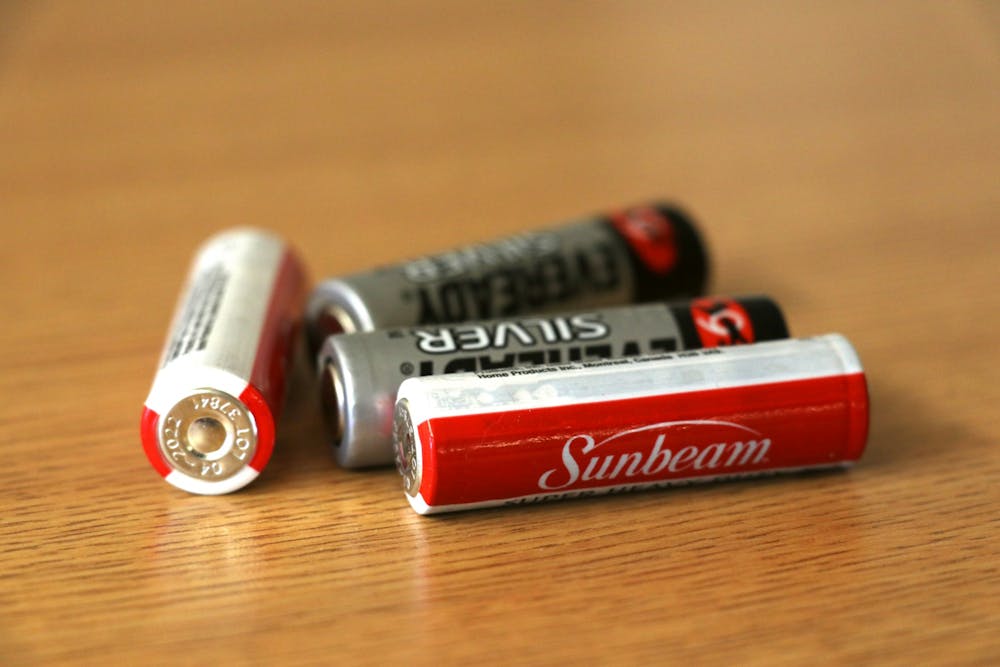Clean paper, cans, and plastics can usually be tossed into recycle bins on campus, but what about old batteries, damaged electronics, empty ink cartridges and torn clothing? Recycling collection sites are located both on and off campus.
Out of all on-campus waste, around 40% is reused, recycled or composted, said Makayla Bonney, assistant director of sustainability at IU. IU tracks campus sustainability with a widely used ranking system.
"For our region, for a university of this size, our consultants told us we're kind of in the middle of the pack," Bonney said. "We're performing comparably to our peers."
Over the past three years, the university’s waste production has decreased by 18% per person, Bonney said. She said students can decrease their waste production by implementing reusable bags, containers and cups into their daily lives.
Freshman Lindsey Baeza said she uses recycled cloth bags to carry her books and groceries to reduce her plastic use.
“We’re living in a day and age where it’s becoming life or death, I feel like,” Baeza said. “We need to start recycling because we’re seeing our Earth deteriorate at a fast pace, and I don’t want to see animals and forests and ecosystems just disappear.”
If you aren't in the dorms, here are some other places on campus or in Bloomington to take your recyclables.
General recyclables
Plastic bottles and food packaging can be recycled in campus recycle bins, but these items are not recyclable if they have food in them. According to Sustain IU’s Recycling Guide, small amounts of food are acceptable, but a quick rinse is helpful before tossing items into a recycling bin.
Pizza boxes are not recyclable if grease has seeped into the cardboard. If one side of the box has little to no grease on it, that half can be torn off and recycled.
Electronics
Students can dispose of batteries in the white buckets located near the loading docks of Ballantine Hall, the Intramural Center and the Indiana Memorial Union, according to Sustain IU’s Recycling Guide. Every RPS Hall also has a battery bucket in its center hall.
Monroe County Solid Waste Management on South Walnut Street recycles and accepts electronics, metals, glass, hazardous waste including batteries and other general recyclables.
Best Buy also accepts electronics and appliances, including video games, cameras and computers. Best Buy offers a 15% off coupon for HP Printers to individuals who recycle printers through the store.
Clothes
H&M accepts torn, stained or damaged clothing, Bonney said. The store collects used clothing at checkout as a part of a upcycling and recycling initiative. According to H&M’s website, the company collected 20,649 tons of material.
Bonney said purchasing pre-owned items decreases one’s carbon footprint. She recommends shopping at thrift stores and secondhand stores.
Goodwill also contributes to reuse efforts. The store accepts gently used clothing, furniture, games, DVDs and other miscellaneous items, according to the company’s website.
What items can’t be recycled?
According to Sustain IU’s guide, the following materials do not belong in the recycling bin: aerosol cans, non-biodegradable plastic silverware, straws, paper towels, tissue and toilet paper. Hot beverage cups are not recyclable, but lids and sleeves are. Styrofoam is usually not recyclable unless it is labeled as a Plastic #6.
Where does it all go?
Items placed in recycling bins on campus are brought to a transfer station owned by Republic Services on the south side of Bloomington, Bonney said. At this transfer station, waste and recyclables are sorted into a landfill bay or recycling bay. Any contaminated items, such as wet papers or containers with food in them, are filtered out and sent to a landfill, so Bonney said people should be careful what they put into the recycling bins.
Items in the recycling bay are transported to Republic Services’ processing site in Indianapolis. There, the recyclable materials are sorted, Bonney said. The materials are compressed into bales and sold to create new items, such as cardboard boxes.




